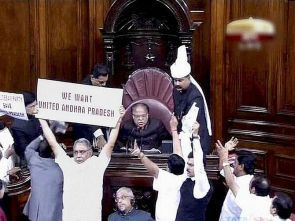 It is quite likely that the Parliament itself could now attract people’s scorn. That would be terrible, and not the people but the politicians would be responsible, says Mahesh Vijapurkar.
It is quite likely that the Parliament itself could now attract people’s scorn. That would be terrible, and not the people but the politicians would be responsible, says Mahesh Vijapurkar.
When did we last hear a good speech in Parliament, even if not of the same distinguished content and resonance as Jawaharlal Nehru’s Tryst with Destiny speech? Or, when did we hear a speech that stirred the country in the past two decades except perhaps A B Vajpayee’s when he quit after 13 days in the prime minister’s office?
When was the last erudite speech guiding the making of a law get referred to in a subsequent law-making event? Babasaheb Ambedkar’s speeches are cited in apex courts to explain the intent of a law. When did members, arrayed on opposite sides of the house, verbally joust and jab and make sense? And persuade the opponent to see reason?
It is not that we lack impressive, not great speakers -- Kapil Sibal, Arun Jaitley, Sushma Swaraj, Yashwant Sinha, P Chidambaram, and because of a possibly a speech writer for even a brief parliamentary intervention for Rahul Gandhi, him -- but the manner in which Parliament has been conducting business of late has made even them redundant.
Instead of the benches, from where they are to rise and speak, a new arena has been found: the well of the house which is not the domain of the MPs at all. It is a space for the staff and also, as was perhaps thought in the past, to keep some distance between the rivals.
In that space, you don’t speak but scream, don’t argue but raise slogans, throw away respect for the Speaker, custodian of the legislative body’s rights and privileges, turn a deaf ear to the pleadings for order. It is where the attention is. The cerebral -- as is expected of law-makers -- is replaced by the brawn. The past week showed plenty of it, thanks to the Telangana issue.
Din, ruckus, pandemonium are the words that come to mind but as Parliament slides further down, new adjectives are to be now searched for to describe the conduct. L Rajagopal took it to its nadir when he used a spray, that The Hindu reported, was carrying a chemical barred under the international convention on chemical warfare. It shouldn’t, but we never know, can get much worse.
It indeed may have. Today, the secretary general of the Rajya Sabha was jostled and a paper he was reading from was snatched. The presiding officer kept saying, “staff cannot be attacked”. In Uttar Pradesh, members stripped to their waist and forced the governor to beat a hasty retreat. In Jammu & Kashmir assembly, members caught and beat up a marshal. In the Delhi assembly too recently, the well was the arena.
Since the qualifications to enter Parliament are political cronyism, electoral merit which only means to anyhow win a constituency with money, caste, criminal background, communalism, its flip side called secularism in India, the ability to make laws is the least of the considerations. That robs the august body of its due share of intellect, the country its due.
Since the arena has shifted from the benches to the well, the discourse has changed. There’s no room for people with delicate sensibilities; it calls for a different calibre. It has tied the country down to the tyranny of the mediocre or worse. Hurtful is the fact that MPs think they can do anything to serve their purpose.
A walk out used to be the stuff of headlines in the past and the treasury benches took them seriously as being a reprimand for a government’s obstinacy. Most politicians ignore that Lok Sabha is where you talk, not fight. The media too -- except for recent critique of such gross behaviour -- had been focusing on this fuss which was lamented but in retrospect, it turns out to be tracking the decline.
Arguing and persuasion to convert the opponent has disappeared. Numerical strength of parties or their coalitions decide the course of law-making. As Justice J S Verma had once said, "I don't think the majority opinion is what they (politicians) reflect. A lot of them are not true representatives of the people”. And looking at their other interests, it sure seems they have made Parliament a club.
However, he had at that time seemed off the mark for he had said in the same breath that, “I have an abiding faith in this: that the majority of the people in our country are positive." The emergence of the Aam Aadmi Party and its win in Delhi and the palpable undercurrent in its favour shows that he was optimistic. This needed a new platform, not the legacy parties; it required an alternative platform.
It is time that the alternate politics are given some consideration and support. Arvind Kejriwal’s sleeping on a sidewalk in dharna was, relatively speaking, more dignified than what MLAs and MPs have been doing inside their legislatures.
It needs no reiteration that the successes so far of the AAP shows there is disenchantment with politicians -- their corruption being only one of the reasons -- and contempt. It is quite likely that the constitutional body itself could now attract people’s scorn. That would be terrible, and not the people but the politicians would be responsible. They are sabotaging it from within.











 © 2025
© 2025